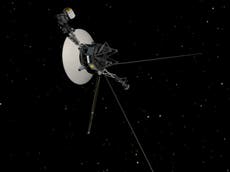New Hubble Space Telescope data suggests ‘something weird’ is going with our universe, Nasa says
Astronomers remain unclear about how the cosmos is expanding
The Hubble Space Telescope has reached a new milestone in its work to find out how quickly the universe is expanding – and it supports the idea that something strange is happening in our universe, Nasa says.
In recent years, astronomers have used telescopes like Hubble to understand exactly how quickly our universe is expanding.
But as those measures have become more precise, they have also shown something strange. There is a key difference between the rate of the expansion of the universe as it is around us, when compared with observations from right after the Big Bang.
Scientists are unable to explain that discrepancy. But it suggests there is “something weird” going in our universe, that could be the result of unknown, new physics, Nasa says.
For the last 30 years, Hubble has been gathering information on a set of “milepost markets” in space and time that can be used to track the expansion rate of the universe as they move away from us.
It has now calibrated more than 40 of the markers, Nasa announced, allowing for even more precision than before.
“You are getting the most precise measure of the expansion rate for the universe from the gold standard of telescopes and cosmic mile markers,” said Nobel Laureate Adam Riess of the Space Telescope Science Institute (STScI) and the Johns Hopkins University in Baltimore, Maryland, in a statement.
He is the leader of a team of scientists who have published a new paper detailing the biggest and what is probably the last major update from the Hubble Space Telescope, doubling the previous set of mile markers as well as reanalysing exsiting data.
The search for a precise measure of how fast space was expanding came when American astronomer Edwin Hubble that galaxies outside of ours appeared to be moving away from us – and doing so faster the further away from us they are. Scientists have been hunting for a better understanding of that expansion ever since.
(Both the rate of expansion and the space telescope that has been researching it are named Hubble, in honour of the astronomer’s work.)
When the space telescope started gathering information about the universe’s expansion, however, it turned out to be more quick than models had predicted. Astronomers predict that it should be about 67.5 kilometers per second per megaparsec, give or take 0.5 – but observations show it is around 73.
There is only a one in a million chance that astronomers have got it wrong. Instead, it suggests the universe’s evolution and expansion is more complicated than we had realised, and that there is more to learn about how the universe is changing.
Scientists hope to delve deeper into that difficulty with the new James Webb Space Telescope, which recently launched to space and is set to send back its first observations soon. That should allow them to see new mileposts that are even further away and in better resolution.




Join our commenting forum
Join thought-provoking conversations, follow other Independent readers and see their replies
0Comments